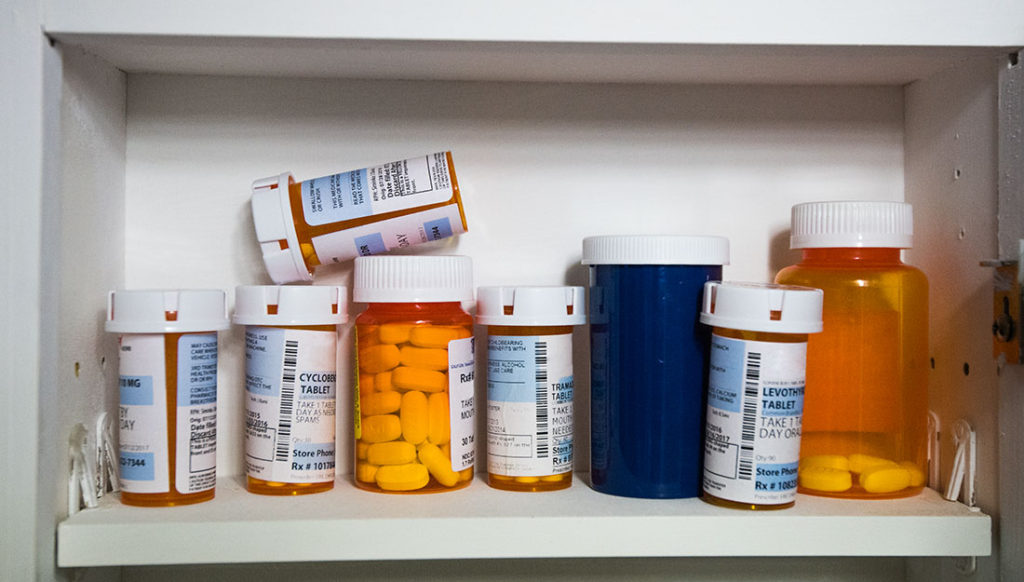Q. I recently read an article that states people should keep all their prescription drug medications locked up so that teenage grandchildren don’t get into them. Is this a widespread problem?
A: It is a very concerning problem of which everyone should be aware. The Food and Drug Administration reports that 1 in 4 teens have misused or abused prescription drugs and most of those came from the family medicine cabinet. A surprising number of heroin users report they started abusing drugs by taking opioid pain killers stolen from a family member.
Of course, everyone, not just grandparents, need to be conscious of the danger medications can pose to children and teenagers, whether it is an accidental ingestion or purposely taken. Sometimes, however, when we are older and don’t have the daily presence of children in the home, it is common to forget the danger and place things in containers that are easier to open, or leave pills out so that we remember to take them. All medicines, both prescription and over-the-counter, should be locked up or moved to a place where they won’t be easily found.
Another good idea is to keep track of your medicines on a regular basis, weekly perhaps, including dosages taken and how many pills you should have left. Locked pill boxes that can have the medicines sorted by time, day, and week are a great way of doing this. This works well, too, if you are visiting someone else’s home, so that pills aren’t easily accessible in your suitcase or purse.
Finally, sort through medications and get rid of those that are old, unused and expired. Check around your home to make sure you don’t have any in the kitchen cupboards, in a coat pocket in the hall closet, or in a purse you haven’t used in a while. Medications should not be flushed or just thrown in the trash. A lot of over the counter medications will have instructions on the label on how to safely dispose of the drug. If you do throw any away, first mix the medication with something that tastes bad, such as coffee grounds or cat litter, and place in a sealed bag or container.
A better choice is to check with your pharmacy or local police about “drug take-back” programs for safe methods of disposing of these medications. April 24 is “National Prescription Take-Back Day” with multiple sites participating nationwide. To find locations near you, go to www.deadiversion.usdoj.gov and click on the Take Back link or contact your County Sheriff’s office.

Q. My grandmother ended up in the ER because she took a once-a-day medication multiple times in the same day due to her memory problems. What are some ideas to help her take the right medication at the right time?
A: Taking multiple medications for different conditions can lead to potentially hazardous situations for older adults. Medications getting mixed-up, failing to take medication in a timely manner, or over-dosing medication are all harmful problems that can occur.
There are options for medication management that can range from inexpensive devices to more costly in-home care. The one best suited for your grandmother’s situation depends on what her needs are and what problem needs addressing. For instance, if a weekly pill box has always been helpful, but now she is having trouble remembering which day of the week it is, or the time of day to take certain medication, you could try setting up a color-coded system instead, with a chart for reference. If she is not remembering to take her medications at all, a pill box with an alarm can be purchased that requires the individual to take out the pills to turn off the alarm. Or if she is taking all her medications at one time, a locked pill dispenser which only releases the appropriate dose at the appropriate time might be an option. Check with your local pharmacy or medical equipment supplier for options.
If more supervision is needed, many in-home care providers have staff that can assist with medication management. An unskilled homecare aide can remind someone to take their medications, while a nurse can fill a pill box and assist someone in taking their medications. For a list of area in-home care providers, you can contact the Info-Line for Aging & Disability at 800-654-2810.
Sara Duris is community information liaison of Region IV Area Agency on Aging in Southwest Michigan. Questions on age or independence services? Call the Info-Line for Aging & Disability at 800-654-2810.
